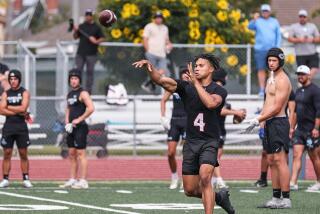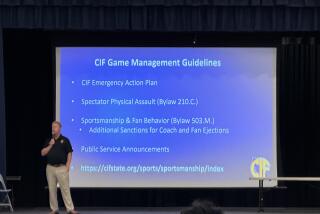Districts Need to Regulate Athletics in the Summer, School Official Says
It was two years ago that Jim Fleming began to get concerned.
Fleming, the superintendent for the Placentia Unified School District, read in the newspaper that six Sunny Hills High School basketball players had been abandoned in the desert along Interstate 10 by their assistant coaches in July of 1987.
They were returning from a summer basketball tournament in Palm Springs. As with all summer sports, it was not a school-sponsored event.
It worried Fleming.
“No matter how you cut it, those kids belonged to that school district,” Fleming said. “It focused my concerns on our own summer athletic programs. I don’t care if the event is officially sponsored by the YMCA or whoever, they’re our kids and our coaches, using our equipment. It’s our program if something bad happens.”
Fleming will be the superintendent representative for the California Interscholastic Federation during the next school year and plans to take up the issue of summer athletics.
Since Prop. 13 cut back school funding, most summer leagues have been on their own and unrestricted. Leagues are sponsored by parks and recreation departments, the Boys Scouts of America, even by coaches themselves.
But after the Sunny Hills’ incident, Fleming felt it was time for districts to get involved. He already has established a watchdog policy for the three high schools within the Placentia district and would like to see the CIF get more involved.
“I think the CIF and the districts need to accept these programs,” Fleming said. “We need to create a season of sport or eliminate summer play completely.”
The CIF has three seasons of sport--fall, winter and spring. The CIF did regulate summer athletics, but gave the responsibility to the individual district in the late 1960s.
“The CIF is out of business during the summer,” CIF Commissioner Tom Byrnes said. “Our basic trust is to regulate athletics during the school year. During the summer, kids are out of school.”
Last summer Southern Section Commissioner Stan Thomas said he attempted to get the CIF involved in summer programs but was unsuccessful.
“I was interested in creating a fourth season of sport only because of the liability,” Thomas said. “A kid will get injured and some good attorney will nail us all.”
Fleming also is worried about the legal aspects because coaches use school facilities and take teams on trips. Both, Fleming feels, can leave school districts open for a lawsuit.
In his office, Fleming keeps a list of each summer sport within his district. He knows when and where they are playing.
“I think summer athletics need to be regulated,” Fleming said. “A lot of districts are acting like it’s not their problem. They are sticking their heads in the sand.”
Right now, only the Tustin Unified School District is involved directly with its summer leagues.
Most leagues are financed through entry fees. Leagues charge between $50 to $200 per team.
Fleming said that if the districts got involved, they could not charge kids. It would be the only disadvantage, according to Fleming.
“Right now, they can pay the coaches a heck of a lot more than we can,” he said. “But there are problems with that, too. There are some instances where coaches are collecting money not under the auspices of the school. That’s another part of it that needs to be looked into.”
Some coaches prefer to have a wide-open summer. They are concerned that the Southern Section, or CIF, might step in.
“I received a survey last spring from the Southern Section and one of the questions was, ‘Would I like to see summer participation limited?’ ” Ocean View basketball Coach Jim Harris said. “I think there’s already a natural limiting factor, the kids. You can only do so much with them. If something’s good, don’t mess with it.”
Harris also doesn’t think there’s a problem with liability. He said the Huntington Beach-Ocean View varsity-junior varsity league is completely separate from the school and the district.
The league is sponsored by the Huntington Beach parks and recreation department, which has its own liability insurance. Harris even has to make a facility request and pay rent on the gymnasium to the district.
“We have a separate program and separate insurance,” Harris said. “We’re a separate entity.”
All summer leagues are required to carry liability insurance, whether it’s provided by their sponsor or a coach takes out his own policy. But Fleming and others feel that even that might not be enough.
“If a kid from Brea gets hurt in a summer league at Katella High School and his parents can show negligence, they aren’t going to sue the parks and recreation department,” said Katella basketball Coach Tom Danley, whose three summer leagues are sponsored by the Anaheim parks and recreation department. “They’re going to sue Katella High School. It’s time the districts stepped in and accepted the responsibility.”
Fleming said he and several other superintendents will meet with Thomas in the next few weeks to discuss the problems with summer programs. He also said that the superintendents who weren’t concerned are likely not informed about the possible liability problems.
“If anything happens to their kids while he’s wearing a school uniform and using school equipment, that district is liable,” Fleming said. “In many instances they (the superintendents) just don’t know what’s going on.”
More to Read
Get our high school sports newsletter
Prep Rally is devoted to the SoCal high school sports experience, bringing you scores, stories and a behind-the-scenes look at what makes prep sports so popular.
You may occasionally receive promotional content from the Los Angeles Times.







